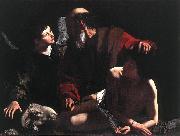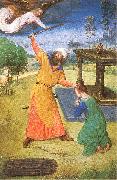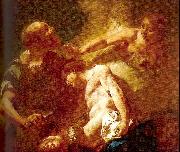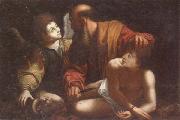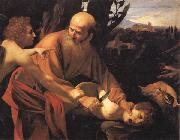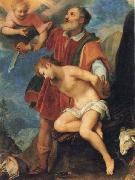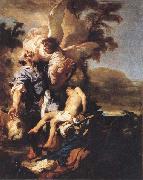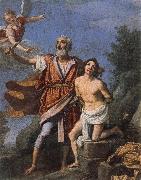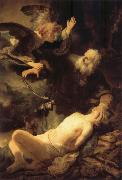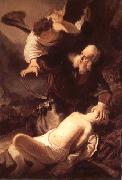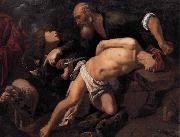Wholesale Oil Painting No Minimum |
|||||||||||
|
|
|||||||||||

|
|||||||||||
|
|
|
||||||||
CaravaggioItalian Baroque Era Painter, ca.1571-1610 Italian painter. After an early career as a painter of portraits, still-life and genre scenes he became the most persuasive religious painter of his time. His bold, naturalistic style, which emphasized the common humanity of the apostles and martyrs, flattered the aspirations of the Counter-Reformation Church, while his vivid chiaroscuro enhanced both three-dimensionality and drama, as well as evoking the mystery of the faith. He followed a militantly realist agenda, rejecting both Mannerism and the classicizing naturalism of his main rival, Annibale Carracci. In the first 30 years of the 17th century his naturalistic ambitions and revolutionary artistic procedures attracted a large following from all over Europe. |
||||||||
|
|
||||||||
The Sacrifice of Isaac
The Sacrifice of Isaac Painting ID:: 322 |
c1596
Barbara Piasecka Johnson Collection, Princeton, NJ
c1596 Barbara Piasecka Johnson Collection, Princeton, NJ |
|||||||
|
|
||||||||
Marmion, SimonFrench-born Flemish Northern Renaissance Painter, ca.1425-1489 French illuminator and painter. He was trained in Amiens and established a productive workshop in Valenciennes, but at the end of his career appears to have had connections with manuscript painting in the southern Netherlands. Although no signed or documented works survive, many illuminated manuscripts and some panel paintings have been convincingly attributed to him and his workshop. On the basis of these he has been recognized as an important figure in the development of both French and Netherlandish painting. |
||||||||
|
|
||||||||
|
|
The Sacrifice of Isaac
The Sacrifice of Isaac Painting ID:: 19296 |
1487-89
Parchment
British Library, London. 1487-89 Parchment British Library, London. |
||||||
|
|
||||||||
PIAZZETTA, Giovanni BattistaItalian Rococo Era Painter, ca.1683-1754 |
||||||||
|
|
||||||||
|
|
The Sacrifice of Isaac
The Sacrifice of Isaac Painting ID:: 19868 |
1715
Oil on canvas
Museo Thyssen-Bornemisza, Madrid. 1715 Oil on canvas Museo Thyssen-Bornemisza, Madrid. |
||||||
|
|
||||||||
|
|
||||||||
|
|
The sacrifice of isaac
The sacrifice of isaac Painting ID:: 27519 |
mk56
oil on canvas,
unframed
mk56 oil on canvas, unframed |
||||||
|
|
||||||||
CaravaggioItalian Baroque Era Painter, ca.1571-1610 Italian painter. After an early career as a painter of portraits, still-life and genre scenes he became the most persuasive religious painter of his time. His bold, naturalistic style, which emphasized the common humanity of the apostles and martyrs, flattered the aspirations of the Counter-Reformation Church, while his vivid chiaroscuro enhanced both three-dimensionality and drama, as well as evoking the mystery of the faith. He followed a militantly realist agenda, rejecting both Mannerism and the classicizing naturalism of his main rival, Annibale Carracci. In the first 30 years of the 17th century his naturalistic ambitions and revolutionary artistic procedures attracted a large following from all over Europe. |
||||||||
|
|
||||||||
|
|
The Sacrifice of Isaac
The Sacrifice of Isaac Painting ID:: 28900 |
mk65
Oil on canvas
40 15/16x53 1/8in
Uffizi.
mk65 Oil on canvas 40 15/16x53 1/8in Uffizi. |
||||||
|
|
||||||||
CIGOLIItalian Baroque Era Painter, 1559-1613 was an Italian painter and architect of the late Mannerist and early Baroque period, trained and active in his early career in Florence, and spending the last nine years of his life in Rome. Lodovico Cardi was born at Villa Castelvecchio di Cigoli, in Tuscany, whence the name by which he is commonly known. Initially, Cigoli trained in Florence under the fervid mannerist Alessandro Allori. Later, influenced by the most prominent of the Contra-Maniera painters, Santi di Tito, as well as by Barocci, Cigoli shed the shackles of mannerism and infused his later paintings with an expressionism often lacking from 16th century Florentine painting. For example, for the Roman patron, Massimo Massimi, he painted an Ecce Homo[1] (now in Palazzo Pitti). Supposedly unbenknownst to any of the painters, two other prominent contemporary painters, Passignano and Caravaggio, had been requested canvases on the same theme. It is unclear if they are completely independent. Cigoli's painting seems to have been made with knowledge of Caravaggio's canvas; however, while Cigoli's work lacks the power of Caravaggio's naturalism, the background shade and sparse foreground shows how much he was moving away from crowded Florentine historical paintings. This work was afterwards taken by Bonaparte to the Louvre, and was restored to Florence in 1815. One of his early paintings was of Cain slaying Abel. He then gained the employ of the Grand-Duke in some works for the Pitti Palace, where he painted a Venus and Satyr and a Sacrifice of Isaac. Other important pictures are St. Peter Healing the Lame Man in St Peter's; Conversion of St. Paul in the church of San Paolo fuori le Mura, and a Story of Psyche in a fresco incorporated in the decorative scheme of the Villa Borghese; a Martyrdom of Stephen, which earned him the name of the "Florentine Correggio", a Stigmata of St. Francis at Florence. Cigoli was made a Knight of Malta at the request of Pope Paul III. Cigoli, a close personal friend of Galileo Galilei, painted a last fresco in the dome of the Pauline chapel of the church of Santa Maria Maggiore in Rome, depicting the Madonna standing upon a pock-marked lunar orb. This is the first extant example of Galileo's discoveries about the physical nature of the moon (as he himself drew it in Sidereus Nuncius) having penetrated the visual arts practice of his day. Until this image, the moon in pictures of the Virgin had always been mythical and smooth, perfectly spherical as described by Platonic & Ptolemaic tradition. |
||||||||
|
|
||||||||
|
|
The Sacrifice of Isaac
The Sacrifice of Isaac Painting ID:: 28938 |
mk65
Oil on canvas
69 1/8x52 1/16in
Pitti,
mk65 Oil on canvas 69 1/8x52 1/16in Pitti, |
||||||
|
|
||||||||
LISS, JohannGerman Baroque Era Painter, ca.1597-1631 |
||||||||
|
|
||||||||
|
|
The Sacrifice of Isaac
The Sacrifice of Isaac Painting ID:: 29029 |
mk65
Oil on canvas
34 5/8x27 3/8in
Uffizi,
mk65 Oil on canvas 34 5/8x27 3/8in Uffizi, |
||||||
|
|
||||||||
Jacopo da Empoli1554-1640 Italian Jacopo da Empoli Location Italian painter and draughtsman. He lived and worked in Florence all his life, and he followed Santi di Tito in the return to the clarity of the Florentine High Renaissance. He absorbed the ideas of his more innovative contemporaries and became one of the most popular painters of altarpieces for churches in Florence and Tuscany. He was also a distinguished still-life painter and received many commissions from private patrons, among them the Medici. Empoli painting is distinguished by simple, lucid forms, strong colour and direct and clear interpretation of the subject. |
||||||||
|
|
||||||||
|
|
The Sacrifice of Isaac
The Sacrifice of Isaac Painting ID:: 29958 |
mk67
OIl on copper
12 5/8x9 13/16in
Uffizi,Gallery
mk67 OIl on copper 12 5/8x9 13/16in Uffizi,Gallery |
||||||
|
|
||||||||
REMBRANDT Harmenszoon van RijnBorn 1606, Died 1669.One of the great Dutch painters and printmakers of the 17th century, Rembrandt van Rijn is best known for his expressive use of light and shadow (also called chiaroscuro) in his many portraits. Raised in Leiden, he studied with Pieter Lastman (1583-1633) in Amsterdam, then returned to Leiden around 1625 and set up shop as a teacher and portrait artist. Sometime between 1630 and 1632 Rembrandt relocated to Amsterdam, where he spent the rest of his career. Though he had his detractors (some of whom considered him coarse and "low born"), Rembrandt was successful and famous during his lifetime, though he fell on financial hard times in his later years. He was a master printer and produced hundreds of group portraits and historical paintings, including The Anatomy Lesson of Dr. Tulp (1632), The Military Company of Captain Frans Banning Cocq (1642) and Aristotle with a Bust of Homer (1653). His portraits -- including a lifelong trail of intriguing and rather frank self-portraits -- reveal his interest in psychological study and continue to be admired as landmarks in Western art. The Military Company of Captain Frans Banning Cocq is also known as "The Night Watch" because it was thought the painting depicted a nighttime scene. When the painting was cleaned in the 1940s it became obvious that it depicted a daytime scene... He married Saskia van Ulenburgh (also Uylenburgh) in 1634. |
||||||||
|
|
||||||||
|
|
The Sacrifice of Isaac
The Sacrifice of Isaac Painting ID:: 34459 |
mk93
1635
Oil on canvas
76 1/5x52 1/4in
Hermitage,St.Petersburg
mk93 1635 Oil on canvas 76 1/5x52 1/4in Hermitage,St.Petersburg |
||||||
|
|
||||||||
Rembrandt van rijn1606-1669 Dutch painter, draughtsman and etcher. From 1632 onwards he signed his works with only the forename Rembrandt; in documents, however, he continued to sign Rembrandt van Rijn (occasionally van Rhyn), initially with the addition of the patronymic 'Harmensz.'. This was no doubt in imitation of the great Italians such as Leonardo, Michelangelo, Raphael and Titian, on whom he modelled himself, sometimes literally. He certainly equalled them in fame, and not only in his own country. His name still symbolizes a whole period of art history rightfully known as 'Holland's Golden Age'. In 1970-71 a great exhibition in Paris was devoted to it under the eloquent title Le Si?cle de Rembrandt. A century before, a popular work of cultural history by C. Busken Huet referred to the Netherlands as 'the land of Rembrandt'. His fame is partly due to his multi-faceted talent. Frans Hals was perhaps at times a greater virtuoso with the brush but remained 'only' a portrait painter. Vermeer may have excelled Rembrandt in the art of illusion but was less prolific. Rembrandt was not only a gifted painter but also an inspired graphic artist: he has probably never been surpassed as an etcher, and he often seems inimitable as a draughtsman. His subjects reflect his manifold talent and interests. He painted, drew and etched portraits, landscapes, figures and animals, but, above all, scenes of biblical and secular history and mythology. |
||||||||
|
|
||||||||
|
|
The Sacrifice of Isaac
The Sacrifice of Isaac Painting ID:: 51765 |
nn09
1634
Oil on canvas
158x117cm
nn09 1634 Oil on canvas 158x117cm |
||||||
|
|
||||||||
ORRENTE, PedroSpanish Baroque Era Painter, 1580-1645 Spanish painter. He is one of the most interesting artists of his day. His father, Jaime Orrente, was a merchant from Marseille, his mother, Isabel Jumilla, from Murcia. By 1600 Orrente was active in Toledo, where he was commissioned to paint a retable (untraced). In 1607 and again in 1611 he was in Murcia, and a journey to Italy recorded by Jusepe Mart?nez and Palomino must have taken place between those years. It seems certain that he visited Venice and met Leandro Bassano |
||||||||
|
|
||||||||
|
|
The Sacrifice of Isaac
The Sacrifice of Isaac Painting ID:: 52674 |
1616 Oil on canvas, 133 x 167 cm 1616 Oil on canvas, 133 x 167 cm |
||||||
|
|
||||||||
|
ORRENTE, Pedro Spanish Baroque Era Painter, 1580-1645 Spanish painter. He is one of the most interesting artists of his day. His father, Jaime Orrente, was a merchant from Marseille, his mother, Isabel Jumilla, from Murcia. By 1600 Orrente was active in Toledo, where he was commissioned to paint a retable (untraced). In 1607 and again in 1611 he was in Murcia, and a journey to Italy recorded by Jusepe Mart?nez and Palomino must have taken place between those years. It seems certain that he visited Venice and met Leandro Bassano The Sacrifice of Isaac 1616 Oil on canvas, 133 x 167 cm |
||||||||
|
|
||||||||
|
Prev Next
|
||||||||
|
|
||||||||
|
Related Paintings to ORRENTE, Pedro :. |
||||||||
|
|
||||||||
|
CONTACT US |
